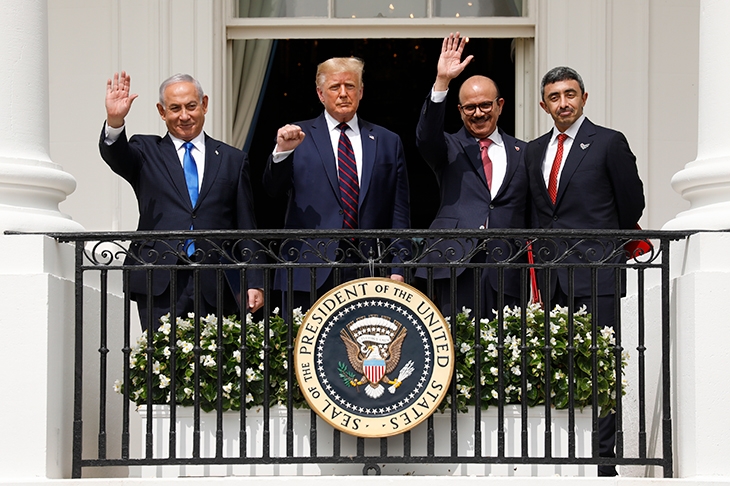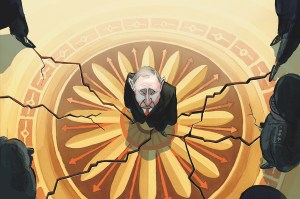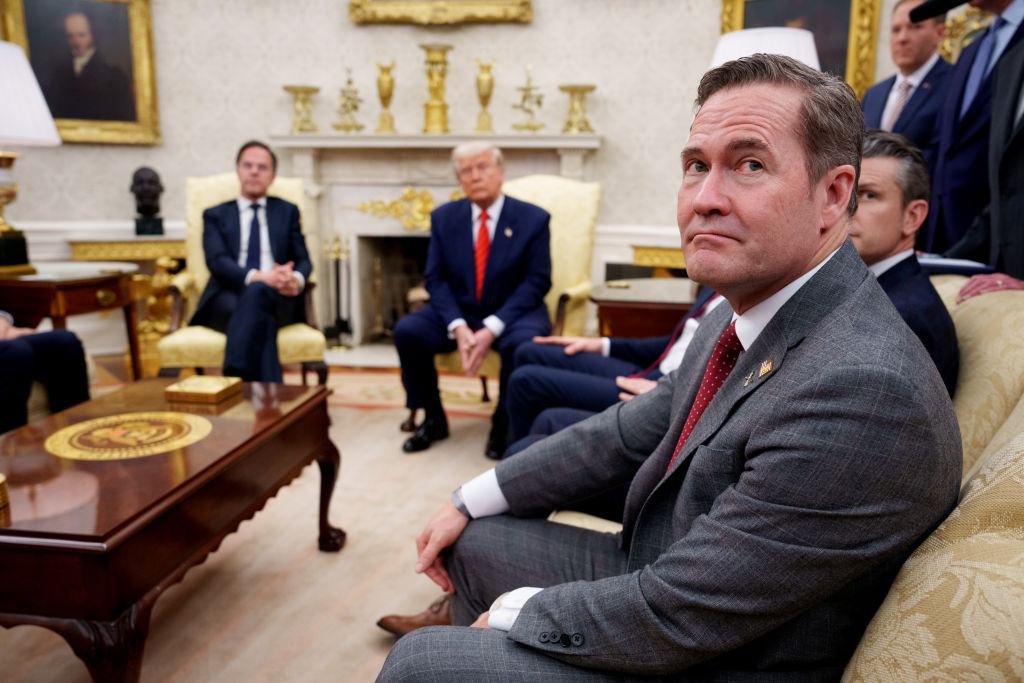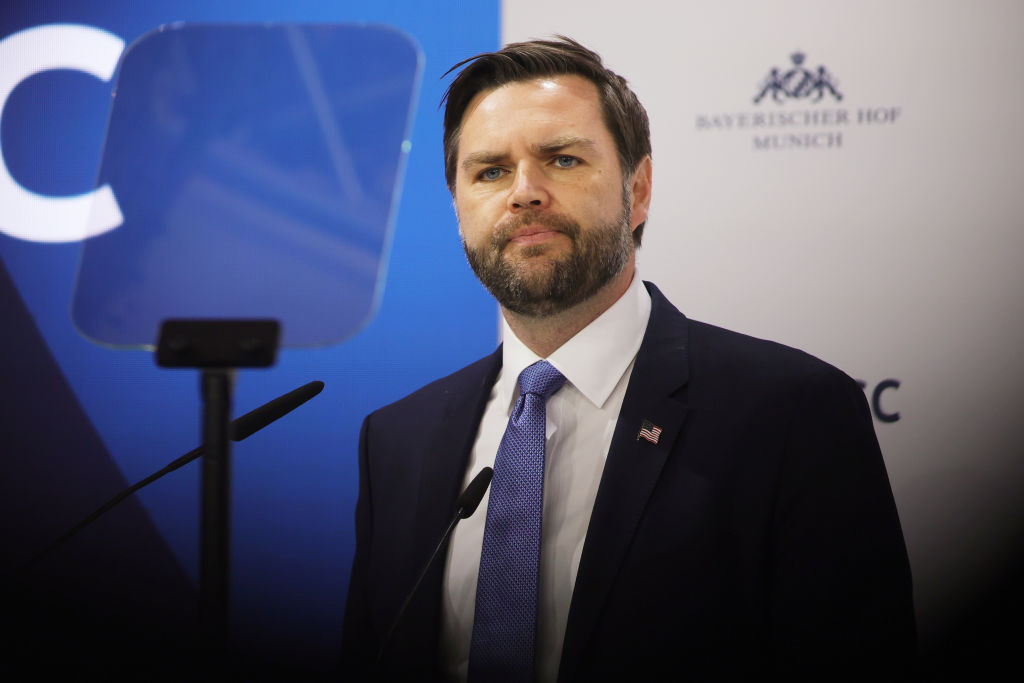Various luminaries from the Republican party have begun turning up on social media, on television and in newspapers urging Americans to vote for the Democratic nominee Joe Biden. One group of foreign policy mandarins recently signed a letter declaring that President Trump has ‘gravely damaged America’s role as a world leader’ by aligning himself with dictators, dishonoring the rule of law, imperiling national security and more.
I have no involvement with the Trump administration or campaign, and never have. But I beg to differ.
Consider the scene on the White House’s south lawn this week, where Trump presided over a historic deal between Israel, the UAE and Bahrain. The Saudis might soon follow suit. Which raises the question: has Trump’s foreign policy really been such a disaster?
Yes, there is still much to worry about in the foreign policy landscape. And yes, many accusations of the Trump administration’s inconsistency are perfectly fair. America’s policy towards China, towards its trading partners and towards its European allies have all been muddled. But this is hardly the first administration to be inconsistent in its policies — Barack Obama’s ‘red line’ in Syria being just one example.
Trump’s Republican critics have yet to acknowledge that several of his initiatives actually address their complaints about the previous administration. One obvious case is Obama’s Iran nuclear deal, deplored by many in the GOP as a deliberate effort to dodge the usual treaty process. They argued forcefully against the verification protocol, saying that long-standing US arms control policies had been reversed in favor of ‘trust — and don’t bother verifying’.
Republicans might at least acknowledge that Trump’s withdrawal from the Iran deal was the right move. Or see the rationale for new sanctions that have succeeded in isolating and constraining Iran’s ability to create problems for the US and Israel. So far, it has undermined damage that Obama’s expansive (and expensive) deal was permitting.
Which brings us to Exhibit B: Trump’s decision to take out the über-powerful terror chief, Islamic Revolutionary Guard leader General Qasem Soleimani. There’s no question that his assassination was risky and more confrontational than previous moves against Iran’s terror network. I can imagine the US intelligence community might have urged extreme caution, saying it would trigger immediate scenes of dire retribution. But there has been no conflagration. This might come, to be sure, but for now the move has arguably exposed Iran’s weakness on the world stage. Had the Soleimani question been decided by the old foreign policy establishment, would they have had the stomach to buck international opinion and take that risk? I have doubts.
Exhibit C is the decision to switch the US embassy from Tel Aviv to Jerusalem, another significant move that met with great opprobrium. At the UN, 128 countries voted against it. Let’s not forget that a succession of US administrations had promised to do just this, though none had any intention of following through because of the long-held conviction that doing so would cause the streets to run with blood as the Arab world erupted in anger. The US military positioned aircraft and navy vessels to evacuate victims of this widely anticipated violence. In the event, none of that proved necessary. The whole episode underlined the absence of what is called the ‘Arab street’. It turns out that the Palestinian cause stirs minimal support in the broader Arab world. The BBC’s correspondent at Jaffa Gate was among many foreign correspondents awaiting the uprising. He finally concluded that more journalists were present than anyone else.
Something else to bear in mind: Trump envoy Richard Grenell’s work on an economic normalization deal in the Balkans. Earlier this month, the administration announced a deal between Serbia and Kosovo that will lead to the establishment of a single market, despite Serbia’s long-standing opposition to Kosovo’s independence. While not without complications, the deal includes — among other surprises — the intention of both countries to open embassies in Jerusalem.
It’s all a bit too much for the European Union, which sees itself as the region’s peacemaker. The EU warned Serbia and Kosovo that opening Jerusalem embassies could adversely affect their aspirations to join. But in addition to upending precedents, the agreement marks a strikingly different tone from the previously pro-Russian Serb government. This doesn’t quite fit with the common allegation that the Trump administration is bent on mollifying Putin.
[special_offer]
Another key complaint centers around Trump’s supposed ‘isolationist’ policies: that he has abandoned Nato, as witnessed by the recent decision to reduce US troops in Germany. Had Obama or Biden undertaken that move, their decision would likely have met with accolades on both sides of the Atlantic. But because it’s Trump, it’s utterly unacceptable. Can anyone tell us what purpose 50,000 US soldiers and Department of Defense employees in Germany might serve, other than to ‘reassure’? What are they defending against, exactly — a putative Russian attack through the Fulda Gap?
A particularly sore point has been Trump’s unvarnished language in insisting that Europeans shoulder a bigger share of Nato’s budget. The President may lack the necessary diplomatic skills to navigate these waters, but there is no arguing that his position is identical to that of Robert Gates, who served as Secretary of Defense under both George W. Bush and Obama. Year after year, Gates would fetch up at the Munich conference and politely ask the Europeans to contribute more to their own defense. All too regularly there was a collective yawn. Trump, by contrast, scolded them. They didn’t like it and protested lustily. Then, for the first time in decades, several allies actually committed to increased spending.
The received wisdom is determined to prove Donald Trump a failure, a one-man wrecking ball to the hallowed US foreign policy tradition. I had no expectations when he came to office. But any fair analysis must concede that he has tackled some entrenched foreign policy problems and put US interests to the fore. Courage is, I fear, a shrinking commodity among our leaders. It would be interesting to hear which of the complaining Republican luminaries would have undertaken any of the above.

























